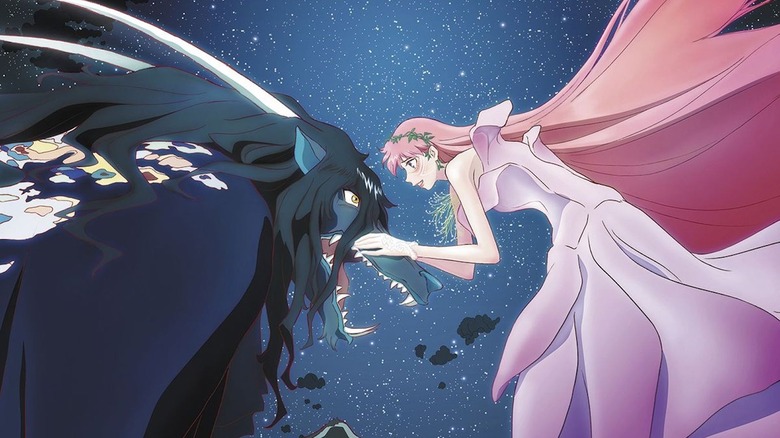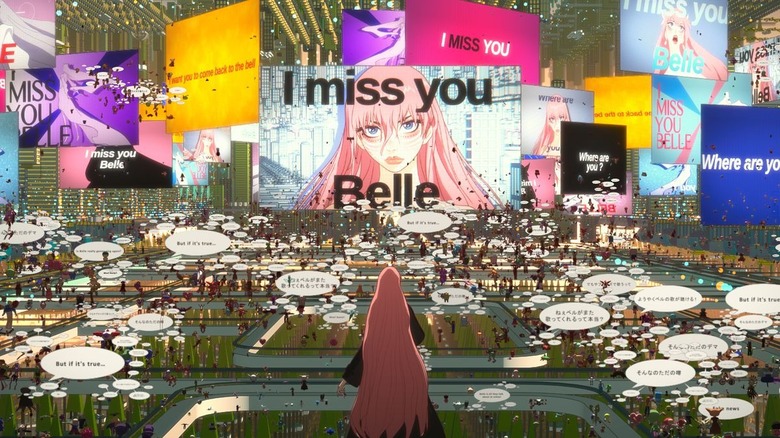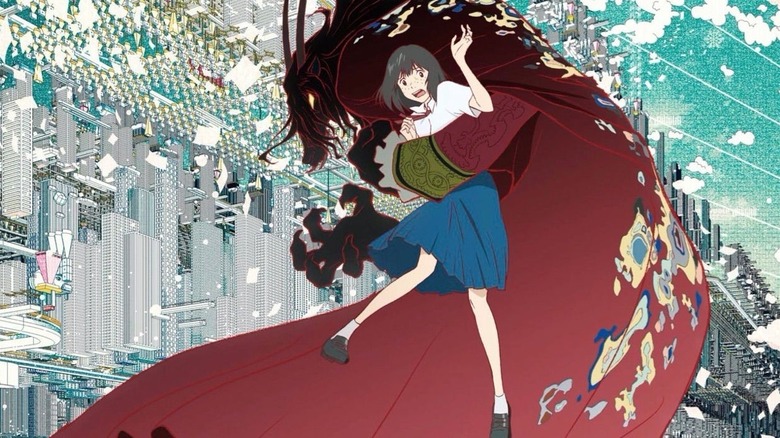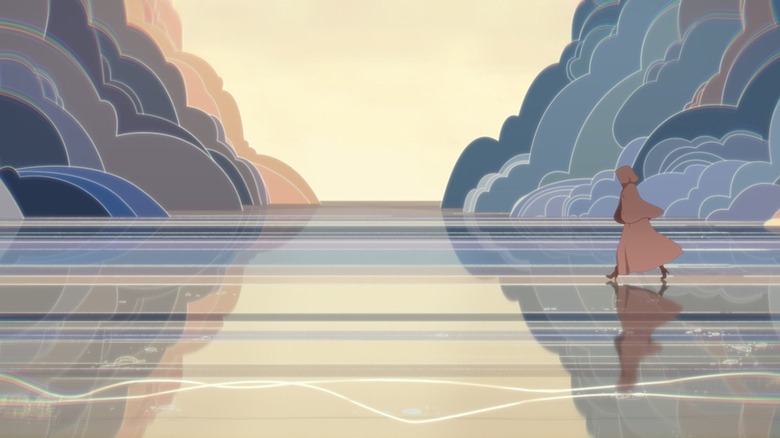Belle Director Mamoru Hosoda Wants To Create A Kinder Digital World [Interview]
With "Belle," director Mamoru Hosoda dares to imagine a kinder internet. It seems like a fantasy, right? In this day and age, when people can be radicalized to believe all sorts of dangerous conspiracy theories or global pandemics are drawn out because of the proliferation of mistrust and paranoia, a kind internet seems like an impossible dream. But in Hosoda's digital-inspired reimagining of "Beauty of the Beast," it is possible.
"I felt it was important to tell another story about this sort of internet space, in this present day," Hosoda told me in an interview ahead of the release of "Belle" (now in theaters).
In "Belle," high school teenager Suzu is shy, withdrawn, and unable to sing after a traumatic incident in which her mom lost her life. But she finds freedom and a new identity through U, the virtual reality where anyone can take on a new avatar and pursue their passion — whether that be singing, fighting, or floating around in a sprawling digital cityscape. It's an imaginative, candy-colored vision of virtual reality, populated with just as many humanoid avatars as it is fluffy chibis. And then there's the Dragon, a scarred beast-like fighter who catches the attention and earns her sympathy. But this isn't a love story.
"I think there's this sense that, in many ways, romance solves everything," Hosoda said. "And when you find that prince and you fall in love, it's a happily ever after. And this is a very common story that's been told in fairy tales, but how can you guarantee the person you fall in love with is a prince of some sort, and that he'll deliver you to that happiness?"
Instead, "Belle" is about delivering one's own happiness, whether that's by opening up to loved ones or using the internet to show kindness to strangers. We could all use it.
I spoke with Hosoda about "Belle," the different kinds of love that can be shared between people, and the internet of it all.
This interview was conducted through a translator and has been lightly edited for clarity.
"Internet, internet, internet."
So after your last three films dealt intimately with parenthood, "Belle" feels like a return to your earlier films like "Digimon" or "Summer Wars." What brings you back to the digital world?
Internet, internet, internet. Twenty years ago when I made "Digimon" and "Summer Wars," I think the internet was in a much different state and it's constantly changing. And our relationship with the internet is changing, but because the internet has shifted so much between these 20 years, I wanted to kind of reimagine ... I wanted to make another kind of interpretation of the internet world. And initially when I was making "Digimon," "Summer Wars," I think the internet was still only really utilized by a very few people. And it had this very positive energy of the younger generations going to use this new tool and change the world and smash the old establishment.
But now I feel many more people have joined the internet and it's become very much a daily necessity. So because of that, they've brought a lot of the more negative aspects of our society, as well as their own kind of toxicity and the fake news. So it's become a reflection, and possibly not the best reflection, but a reflection of our society, in many ways. So I felt it was important to tell another story about this sort of internet space, in this present day.
The world of U is so different from the digital world that we see in "Summer Wars." How did you conceive of the design and space for the world to better reflect our current reality?
Had I made the design of U the same as "Summer Wars," I think I'd get called out for reusing imagery or whatnot, but joking aside, the image of the internet has shifted. And I tried to visually express that shift that we're witnessing, where in "Summer Wars" and before it was a much more wider space that had this sense of openness, that there was a lot of possibilities and the use of color was much different. Whereas now the internet, I think has become a much more complex, melting pot of different global cultures and backgrounds. So we wanted to take it in a much different direction and make it look like this massive mega-city that doesn't have an up or down or left or right.
So when I spoke to you last ahead of "Mirai," you spoke about how you brought your own life into your films and drew inspiration from your real life. What did you draw on for "Belle"?
So to your point, a lot of my works does tap into different aspects of reality or rely on some of my own personal experiences all the way back from "Summer Wars," but for "Belle," oftentimes I've had some interviews and journalists say, "Oh, well, this one must be different because the protagonist is a high school girl." But actually, I can say that I've been heavily inspired to make this movie by my five-year-old daughter who, at home, she's the princess and the center of the attention; she runs around and is extremely active.
But when she goes into kindergarten, she turns into this extremely shy, introverted girl that only has one friend. So thinking about how she's going to grow up and go through grade school, middle school, and high school, she's going to have a smartphone, go on social media. And how is she going to interact, and deal with a lot of the other people around her? So I think it's going to be a much different reality than what we experienced growing up. So that's why, while making this movie and writing it, I really imagined what my daughter would be going through. And I tried to put myself in her shoes in many ways, so it is like the other past works there. It does rely on something really close, a story that's really close to me.
"I think there's this sense that, in many ways, romance solves everything."
Suzu, the character upon whom your daughter is loosely based, does go through quite a lot of hardship. She loses her mother. She endures a lot of trauma for that and is only able to step out of her shell by looking to protect others as her mother did. Is there something in exploring those hardships and traumas, something that you maybe hope your daughter won't experience, or is it just something that was separate from the real-life inspirations?
When you have a kid, I think this perhaps is universal for all parents, but you have to imagine how your kid is going to grow up. And naturally, you would love for them to grow up in a world with no troubles or struggles. But as we know, life is seldom that easy. So when you know they're going to encounter certain challenges or certain struggles in life, they have to accept and learn from it, grow from it. And then kind of come to terms with certain hardships. It's not just fun games all the time. So I wanted to make sure that Suzu wouldn't lose, in a way, to that force of life that's trying to push back.
So in a way, she has to discover her own strength and feed it back to herself so she can overcome certain things. And the traumatic experience, I think, through saving these two boys, she overcomes an experience that helps her understand where her mother was coming from. And I think it took a while for her as a character to come to terms with why her mother would save a complete stranger. So life is not, of course, just about the trauma. And through that experience of understanding her mother's perspective, Suzu's able to move forward.
So "Beauty and the Beast" is a love story, a romantic love story. But what I like about "Belle" is that it's not just about romantic love. It's about familial love and unconditional love that you can feel, even for strangers. What made you want to explore these different types of love through a romantic tale like "Beauty and the Beast"?
I think there's this sense that, in many ways, romance solves everything. And when you find that prince and you fall in love, it's a happily ever after. And this is a very common story that's been told in fairy tales, but how can you guarantee the person you fall in love with is a prince of some sort, and that he'll deliver you to that happiness? And in the 18th-century original classic works of the "Beauty and the Beast," this was a very male-dominated society. The lens through which we viewed society I think was much different. And there was a very narrow definition of what it meant to be beautiful and primarily having to do with the exterior appearance. And the only way these women who were suppressed could find freedom was through marrying a prince. That was really their only escape. But fast forward to 2021 and there are many other ways to attain freedom and not necessarily finding the prince, delivering them to happiness.
And the idea of Beauty for me in "Belle" is really about finding that inner strength within herself. And when Suzu's able to find this, that's when she truly becomes beautiful in the sense of the word. And Suzu, through going into this internet space and becoming Belle and finding this vitality and strength and confidence is able to feed that back to Suzu in the original reality. And then that strength is what she uses to then protect what matters to her in her reality. So you see her in the end, she's covered in mud, she has scratches on her face, but she still has the strength to not give in to the physical threat that is in front of her. And you go back to the 18th-century original work and, I think, if you're covered in mud and have scratches on your face, you would very much be in violation of this definition or narrow view of what it means to be beautiful. But I think that this strength that Suzu has found is our modern-day interpretation of Beauty.
"I think there's a lot of .. hidden angles of hidden faces of people that are unable to show in this present reality."
In this film, people can take on any form they want in the world of U. Your films often have a mix of human and inhuman characters. Why is it appealing to you to portray characters as so many different types of creatures?
In the world of U, I think it sort of is implied that somehow this AI is generating a projection of the user and perhaps there is some degree of customization they can do in this process. But for the most part, it pulls in from the user's subconscious. And when you look at the real physical version of a person, it would not make sense to project that into the world of U, because I think there's a lot of different hidden elements or hidden angles of hidden faces of people that are unable to show in this present reality. So by going into this second or different reality, they're able to then project some hidden elements that we may not be able to see. And all of that gets embodied in this avatar that the characters are using in the world of U. So that's how it became such a diverse range of different characters.
"Belle" is a truly international production with Disney animators, Jin Kim and Michael Camacho helping to design Belle and Cartoon Saloon providing the background world of U. What was it like to open up this project of yours to an international team like this?
Given the setting of this current story where characters immerse themselves into this very international world, we wanted to adopt that into the production pipeline in a way, in order to create such a global space, we felt we needed to tap some global talent in order to make sure that every angle of that internet to was represented. So there's a lot of famous people, but also some perhaps not so famous, hidden talent in every area of the internet.
And we wanted to adopt that approach, that creative approach itself into the movie. So we're making sure what we're saying, the message that we're delivering, and what we're doing as a production studio are in some way pointed in the same direction. So the two that you specifically mentioned, Jin Kim, a legend in the Disney character design industry, and Tom Moore [of Cartoon Saloon] was, of course, really, really flattering to be able to work with these two, but also the person who helped us design the world of U is someone we found on the internet named Eric Wong, an amazingly, amazingly talented architecture that we were able to find and work together on U's visual design.
"Belle" is now playing in theaters.



